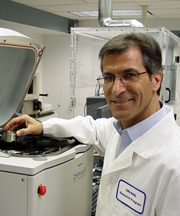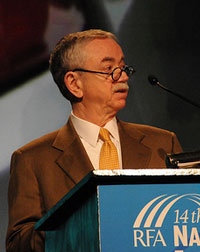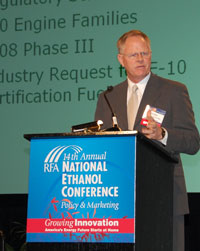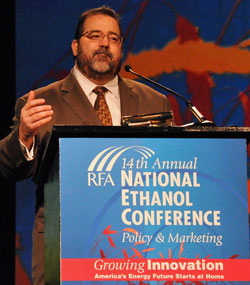
From left to right, Bliss Baker, Executive Director, Global Renewable Fuels Alliance; Gordon Quaiattini, President, Canadian Renewable Fuels Association; Robert Veirhout, Secretary General, European Bioethanol Industry Organization; Bob Dinneen, President and CEO, Renewable Fuels Association
The Renewable Fuels Association, the Canadian Renewable Fuels Association and the European Bioethanol Industry Organization have joined together to form the Global Renewable FuelsAlliance. Their first initiative is to reach out to the World Bank, along with other organizations, to encourage them to make investments in developing countries’ biofuels infrastructure a top priority.
While Brazil is not yet a part of this organization, Bliss Baker, Executive Director, of the Global Renewable FuelsAlliance, said that they have spoken and invited them, along with dozens of other worldwide organizations, to join the alliance. Bob Dinneen, President and CEO of the Renewable Fuels Association followed up by saying, “Quite frankly, we expect them to join.”
The announcement of this global alliance comes on the heals of President Obama’s commitment to continued biofuels development in the States and the cooling of the “food versus fuel debate” which was proven to be a hoax this summer as commodity prices plummeted and food prices skyrocketed. There was a consensus among the group that the time was right to begin working together to help build the global energy infrastructure.
Gordon Guaiattini, President of the Canadian Renewable Fuels Association, stressed the importance of helping developing countries develop their agricultural productivity. “Agriculture productivity and poverty are directly linked.” He wants this new organization to take a similar approach that leading agricultural groups have, who have for years, helped developing countries adopt more sustainable practices while increasing output. He said that they will ensure that biofuels are developed in a sustainable manner that will allow poverty stricken areas to significantly increase their economic condition.
As energy is a global issue, this new alliance, which represents 60 percent of the global biofuels production and 29 countries, will focus on ensuring that international biofuels policies are sustainable, and developed in a way that each countries’ best interest as the center of all decisions. To learn more, visit the Global Renewable FuelsAlliance’s website at www.globalrfa.org.
Click here to listen to the full press conference: [audio:http://www.ethanolrfa.org/ethanolreport/audio/nec-09-grfa-conference.mp3]



 Just moments ago, Pres. Barack Obama, in his first State of the Union Address, laid out his plan he believes will lead to the recovery of the U.S. economy. And alternative energy could wind up being a big winner as part of the plan.
Just moments ago, Pres. Barack Obama, in his first State of the Union Address, laid out his plan he believes will lead to the recovery of the U.S. economy. And alternative energy could wind up being a big winner as part of the plan. Lou Honary, a professor and director of the National Ag-Based Lubricants Center at UNI, says while biodiesel and ethanol produced from traditional crops of soybeans and corn are the obvious choice for the Midwest… despite the criticisms from some city cousins… a diversity of feedstocks and energy sources needs to be the country’s goal:
Lou Honary, a professor and director of the National Ag-Based Lubricants Center at UNI, says while biodiesel and ethanol produced from traditional crops of soybeans and corn are the obvious choice for the Midwest… despite the criticisms from some city cousins… a diversity of feedstocks and energy sources needs to be the country’s goal: Novozymes has been vocal about its commitment to bringing process improvements and lower enzyme costs to market by 2010. They estimate that with the lower enzymes costs a gallon of cellulosic ethanol can be produced for $2.25 per gallon by 2010, which cuts costs by more than half from only 2 years ago while making it competitive with corn-ethanol.
Novozymes has been vocal about its commitment to bringing process improvements and lower enzyme costs to market by 2010. They estimate that with the lower enzymes costs a gallon of cellulosic ethanol can be produced for $2.25 per gallon by 2010, which cuts costs by more than half from only 2 years ago while making it competitive with corn-ethanol. Indirect land-use affects of corn-based ethanol would be “small” reported Thomas Darlington, with Air Improvement Resource, Inc., today during a special press conference as part of the National Ethanol Conference. Darlington has been working with RFA to help legislators, in particular the California Air Resources Board (CARB) and Environmental Protection Agency (EPA) better understand Land-Use Change. Indirect land use research is still in its infancy in terms of the scientific research behind the issue.
Indirect land-use affects of corn-based ethanol would be “small” reported Thomas Darlington, with Air Improvement Resource, Inc., today during a special press conference as part of the National Ethanol Conference. Darlington has been working with RFA to help legislators, in particular the California Air Resources Board (CARB) and Environmental Protection Agency (EPA) better understand Land-Use Change. Indirect land use research is still in its infancy in terms of the scientific research behind the issue. Introducing Jim Ford with API, Renewable Fuels Association president Bob Dinneen stressed the importance of working with the petroleum industry. “They’re our customers, they’re the ones bringing our product to the consumer, so we have to work constructively with them,” said Dinneen.
Introducing Jim Ford with API, Renewable Fuels Association president Bob Dinneen stressed the importance of working with the petroleum industry. “They’re our customers, they’re the ones bringing our product to the consumer, so we have to work constructively with them,” said Dinneen. Kris Kiser, Executive Vice President of the Outdoor Power Equipment Institute, spoke to the National Ethanol Conference on a Marketing Higher Level Blends panel.
Kris Kiser, Executive Vice President of the Outdoor Power Equipment Institute, spoke to the National Ethanol Conference on a Marketing Higher Level Blends panel.  “Some look at what we’re up against and see “an industry in crisis.” I look at what we’re up against and see an industry with the perseverance and determination to succeed,” said Dinneen in his annual address this morning at the National Ethanol Conference in San Antonio.
“Some look at what we’re up against and see “an industry in crisis.” I look at what we’re up against and see an industry with the perseverance and determination to succeed,” said Dinneen in his annual address this morning at the National Ethanol Conference in San Antonio. With the economy in the toilet, I thought I’d get a little inspiration from T. Boone Pickens’ book,
With the economy in the toilet, I thought I’d get a little inspiration from T. Boone Pickens’ book,